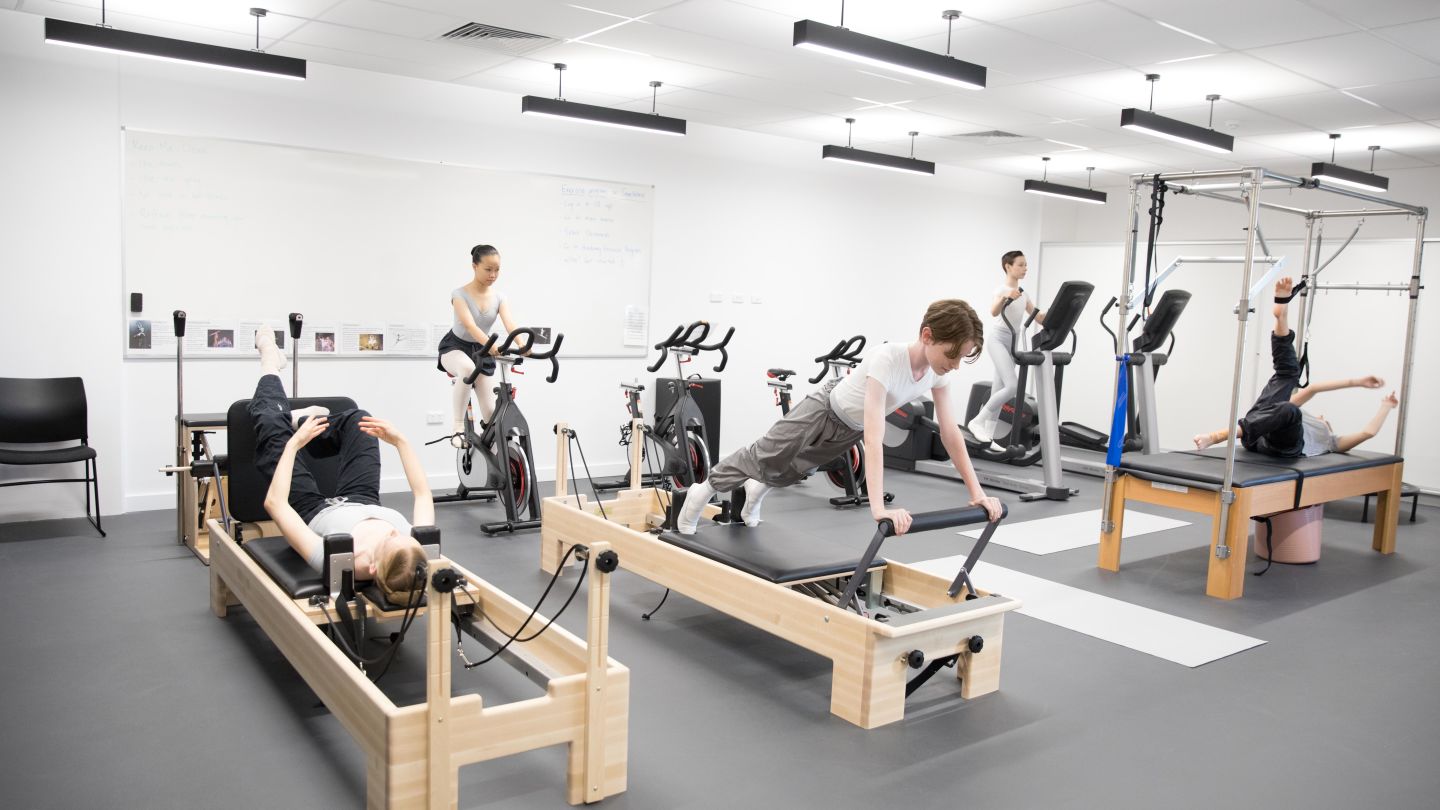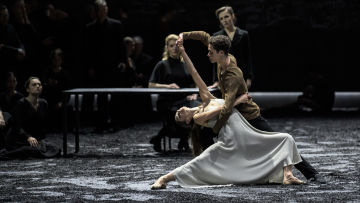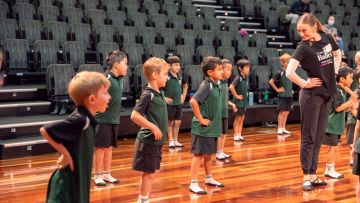Train hard. Eat well. Feel good.
How can our boys (and girls too!) get the most out of their dancing? We sat down with three of the wonderful professionals in our Academy who work tirelessly to keep our students in the best shape possible.

#Body Conditioning
While dancing in itself is an intense workout, keeping the body in peak physical form with regular gym sessions is integral to a dancer’s training and career. At Queensland Ballet Academy, we’re fortunate to work with former Principal Dancer turned Personal Trainer of 17 years, Tony Lewis. Every week, Tony works with our male students in the Academy’s purpose-built gym.
“There’s been a big shift with strength training over the years, especially when I look back to when I was training. One of my friends found a bench and barbell on the side of the road, and we would find whatever was available to make it heavier. That was how we did weight training,” he laughs. “Through strength training, we reduce injury rates and build resilience, which is what I focus on primarily.”
Getting body conditioning advice and planning tailored for dancing is highly advantageous. Tony explains that since dancers are already so in tune with their bodies, they’ll know when something doesn’t feel right quickly.
“With dancers I need to be very aware why I’m giving them a particular exercise to do because they’re more likely to want to know why they should be doing it,” he explains. “There’s little things we try and look at to get just a bit extra out of them to fine-tune things – there’s both science and creativity behind it all.”
Also, if something doesn’t feel right, it probably isn’t! Having a close relationship with a physiotherapist is so important in this field, which is why it’s important to have in-house physios working as part of our Academy and Company Performance Health Team.
#Nutrition
What’s unique about professional dancing is the high energy cost required. Lauren James, Sports Dietitian of 17 years and Queensland Ballet’s Dietitian of 5 years, says that boys in particular need to watch what they eat for optimal performance.
“Many athletes only have key certain periods where they need to perform in a year, for example, marathon runners or triathletes. However, dancers don’t get much time off and are therefore required to maintain peak form throughout the year,” she explains. “For our male dancers, we want them to get stronger and put on lean muscle mass while still growing, and it’s often really challenging to get enough food in to cover all those needs!”
So how do we ensure our boys eat enough to keep up with these bodily demands?
1. Eat well
Consume a balanced diet containing good quality carbohydrates, fruits and vegetables, protein, good fats, and water. Limit your intake of sugars, caffeine, alcohol and junk foods. On average, boys require 15% - 20% more than girls to meet their higher energy requirements.
2. Eat enough
Research has recently shown that on training days, a high number of male dancers were undereating for the energy load required of them. Ideally, boys should be eating enough to keep up with their body’s requirements, plus their dance load, plus growing. Undereating can stunt their bone and muscle growth, causing them to feel sore, stressed or moody, and struggle to complete their dance sessions.
3. Eat regularly and strategically
Comfort is key when you’re at the barre, so find nutrient-rich, compact, easily digestible foods to snack on throughout the day. The last thing a male dancer should be is bulky! It changes their lines, the dynamics of their dance, and makes them less agile. Getting individual nutritional advice can help to ensure he’s eating for lean (not bigger) muscles.
4. Eat with discipline
Discipline is in a dancer’s DNA. However, it goes without saying that you should try to keep up their diet and exercise over holiday periods. Often, we find male dancers in particular going through significant growth spurts over these periods when dance is lessened, so eating to keep up with this process is key.
#Wellbeing
Monitoring student wellbeing is vital in ensuring a young person can succeed in meeting their goals, as academic research suggests a strong correlation between a student’s happiness and their academic success. Queensland Ballet Academy’s Admissions and Wellbeing Manager, Nicola Pierrepont looks after our students to ensure they are content and performing to the best of their ability.
“By studying ballet, our students develop important skills for the future, such as resilience, communication, confidence and a strong sense of self. They also experience the value of belonging to a community of people who share their passion. I have heard several students and parents describe Queensland Ballet as being like a family, which is wonderful to hear. The older boys in particular feel they have grown up together and the training environment at Queensland Ballet Academy has fostered a strong sense of team spirit and camaraderie,” she says.
Another factor that can affect student wellbeing is sleep. Getting a good night’s sleep is an essential process for the adolescent brain to process the information learnt during the day. Sleep also allows the brain to go into cleaning mode and reset for new information the next day. Teenagers often find it hard to ‘switch off’ at night, so minimising screen time before bed is advisable to ensure good quality rest.
Nicola has another tip: “Balancing a busy schedule of elite training, school work and home life can be challenging, but keeping organised is the key! I promote the use of a study planner and early intervention if a student requires more support with their time management.”
Open communication between everyone in the student’s support network is vital in preparing our students to succeed and enable them to take full advantage of the learning opportunities that come their way. Whether a student is feeling stressed about exam preparation, feeling homesick or is just requiring a bit more support in settling into a new routine, our full-time students know Nicola’s door at the Academy is always open for a chat. We have positive role models and well-designed programs to assist our students to develop the necessary tools and skills to navigate through their future pathway, whatever that may look like.
This advice is general in nature and does not apply to a dancer's individual circumstances.
Enjoyed this article? Click here to read more Boys in Ballet Week content!
Image: David Kelly


